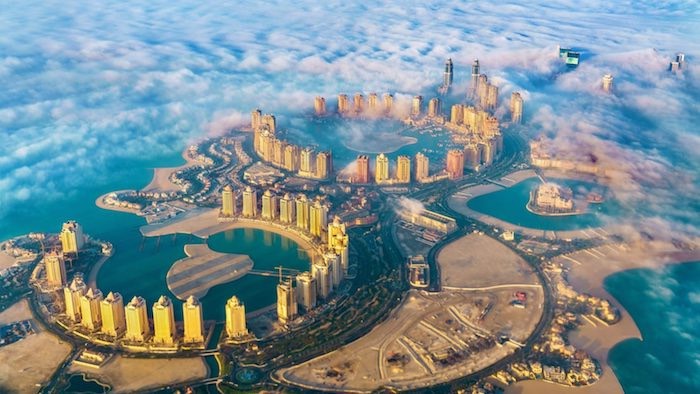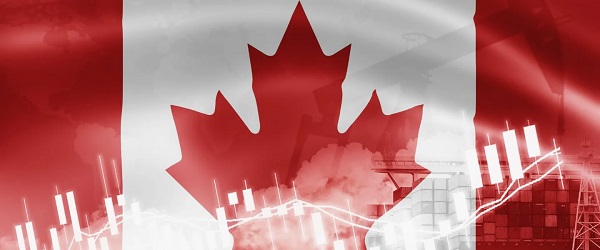Alberta
Qatar, Norway and ‘The Trouble with Canada’

From the Canadian Energy Centre Ltd.
By David Yager
Resource developers in Canada face unique geographical, jurisdictional, regulatory and political obstacles
That Germany has given up on Canada to supply liquefied natural gas (LNG) and instead signed a massive multi-year LNG purchase agreement with Qatar has left many angry and disappointed.
Investment manager and perennial oil bull Eric Nuttall recently visited Qatar and Saudi Arabia and wrote an opinion piece for the Financial Post titled, “Canada could be as green and wealthy as Qatar and Saudi Arabia if government wakes up – Instead of vilifying the oil and gas sectors, Canada should champion them.”
Nuttall described how Saudi Arabia and Qatar are investing their enormous energy wealth to make life better for their citizens. This includes decarbonizing future domestic energy supplies and making large investments in infrastructure.
Nuttall concludes, “Why is it that Qatar, a country that embraced its LNG industry, has nearly three times the number of doctors per capita than Canada? We can do it all: increase our oil and natural gas production, at the highest environmental standards anywhere in the world, thereby allowing us to help meet the world’s needs while benefiting from its revenue and allowing for critical incremental investments in our national infrastructure…This could have been us.”
The country most often mentioned that Albertans should emulate is Norway.
Alberta’s Heritage Savings and Trust Fund has been stuck below $20 billion since it was created by Premier Peter Lougheed in 1976.
Norway’s Sovereign Wealth Fund, which started 20 years later in 1996, now sits at US$1.2 trillion.
How many times have you been told that if Alberta’s politicians weren’t so incompetent, our province would have a much larger nest egg after 47 years?
After all, Canada and Alberta have gobs of natural gas and oil, just like Qatar and Norway.
Regrettably, that’s all we have in common.
That Qatar and Norway’s massive hydrocarbon assets are offshore is a massive advantage that producers in the Western Canada Sedimentary Basin will never enjoy. All pipelines are submerged. There are no surface access problems on private property, no municipal property taxes or surface rights payments, and there are no issues with First Nations regarding land claims, treaty rights and constitutional guarantees.
Being on tidewater is a huge advantage when it comes to market access, greatly reducing operating and transportation costs.
But it’s more complicated than that, and has been for a long time. In 1990, Olympic athlete and businessman William G. Gairdner wrote a book titled, “The Trouble with Canada – A Citizen Speaks Out.” It takes Gairdner 450 pages to explain how one of the most unique places in the world in terms of resource wealth and personal and economic opportunity was fading fast.
That was 33 years ago. Nothing has improved.
As I wrote in my own book about the early days of settlement and development, citizens expected little from their governments and got less.
Today politics increasingly involves which party will give the most voters the most money.
The book’s inside front cover reads how Gairdner was concerned that Canada was already “caught between two irreconcilable styles of government, a ‘top down’ collectivism and a ‘bottoms-up individualism;’ he shows how Canadian society has been corrupted by a dangerous love affair with the former.”
Everything from the constitution to official bilingualism to public health care were identified as the symptoms of a country heading in the wrong direction.
But Canadian “civil society” often regards these as accomplishments.
The constitution enshrines a federal structure that ignores representation by population in the Senate thus leaving the underpopulated regions vulnerable to the political desires of central Canada. This prohibited Alberta’s closest access to tidewater for oil through Bill C48.
Official bilingualism and French cultural protection has morphed into Quebec intentionally blocking Atlantic tidewater access for western Canadian oil and gas.
In the same country!
Another election will soon be fought in Alberta over sustaining a mediocre public health care system that continues to slide in international rankings of cost and accessibility.
What’s remarkable about comparing Canada to Norway or Qatar for missed hydrocarbon export opportunities is how many are convinced that the Canadian way of doing things is equal, if not superior, to that of other countries.
But neither Norway or Qatar have the geographical, jurisdictional, regulatory and political obstacles that impair resource development in Canada.
Norway has over 1,000 years of history shared by a relatively homogenous population with similar views on many issues. Norway has a clear sense of its national identity.
As a country, Canada has only 156 years in its current form and is comprised of Indigenous people and newcomers from all over the world who are still getting to know each other.
In the endless pursuit of politeness, today’s Canada recognizes multiple nations within its borders.
Norway and Qatar only have one.
While relatively new as a country, Qatar is ruled by a “semi-constitutional” monarchy where the major decisions about economic development are made by a handful of people.
Canada has three layers of elected governments – federal, provincial and municipal – that have turned jurisdictional disputes, excessive regulation, and transferring more of everything to the public sector into an industry.
Regrettably, saying that Canada should be more like Norway or Qatar without understanding why it can’t be deflects attention away from our challenges and solutions.
David Yager is an oilfield service executive, oil and gas writer, and energy policy analyst. He is author of From Miracle to Menace – Alberta, A Carbon Story.
Alberta
From Underdog to Top Broodmare

WATCH From Underdog to Top Broodmare (video)
Executive Producers Jeff Robillard (Horse Racing Alberta) and Mike Little (Shinelight Entertainment)
What began as an underdog story became a legacy of excellence. Crackers Hot Shot didn’t just race — she paved the way for future generations, and in doing so became one of the most influential producers the province has known.
The extraordinary journey of Crackers Hot Shot — once overlooked, now revered — stands as one of Alberta’s finest success stories in harness racing and breeding.
Born in humble circumstances and initially considered rough around the edges, Crackers Hot Shot overcame long odds to carve out a career that would forever impact the province’s racing industry. From a “wild, unhandled filly” to Alberta’s “Horse of the Year” in 2013, to producing foals who carry her spirit and fortitude into future generations.
Her influence ripples through Alberta’s racing and breeding landscape: from how young stock are prepared, to the aspirations of local breeders who now look to “the mare that did it” as proof that world-class talent can emerge from Alberta’s paddocks.
“Crackers Hot Shot, she had a tough start. She wasn’t much to look at when we first got her” — Rod Starkewski
“Crackers Hot Shot was left on her own – Carl Archibald heard us talking, he said ‘I’ll go get her – I live by there’. I think it took him 3 days to dig her out of the snow. She was completely wild – then we just started working on her. She really needed some humans to work with her – and get to know that people are not scary.” — Jackie Starkewski
“Crackers Hot Shot would be one of the top broodmares in Albeta percentage wise if nothing else. Her foals hit the track – they’re looking for the winners circle every time.” — Connie Kolthammer
Visit thehorses.com to learn more about Alberta’s Horse Racing industry.
Alberta
Province orders School Boards to gather data on class sizes and complexity by Nov 24

Better data, better outcomes for Alberta students |
To help schools address classroom complexity, Alberta’s government will begin collecting annual data on class size and composition.
Over the past three years, Alberta has welcomed more than 80,000 new students. With this unprecedented growth, classroom complexity and class sizes are among the biggest issues facing schools and teachers across the province.
To meet this challenge head on, Alberta’s government will work with school boards to gather yearly data on class sizes and composition. This information will be used to better understand staffing, student needs and classroom complexity. School boards will be required to submit data on Alberta classrooms by Nov. 24, and by January, this data will be made publicly available and will then be released annually.
Data collected on classroom complexity will help the province understand and address issues in schools, including class sizes, and support strategic investments in classrooms. Over the next three years, school boards will be provided with funding to hire 3,000 teachers and 1,500 new education assistants to support students with complex needs.
“We are ready to work with school boards and teachers to address classroom complexity and class sizes. We have heard them loud and clear and we are taking bold action to address these issues.”
Alberta’s government is establishing a Class Size and Complexity Task Force to begin work immediately on identifying solutions to the challenges facing Alberta classrooms. Alongside new annual data collection, the task force will ensure every student gets the attention and support they need to succeed. Details about the task force will be shared in the coming weeks.
“This data will provide essential insight into classroom realities, guiding evidence-based decisions and advocating for sustainable funding to address complexity, ensuring every student and educator in Alberta has the support to thrive.”
Quick facts
To inform decisions on addressing classroom complexity, data will be collected on total numbers of:
- all staff, per school, including roles
- substitute teachers
- district staff, listed by job title
- students, per classroom, per school
- severe, mild/moderate, and gifted/talented students, per classroom, per school
- English as an additional language (EAL) students, per classroom, per school
- refugee students, per classroom, per school
- First Nations, Métis and Inuit students, per classroom, per school
- Individualized Program Plans, per classroom, per school
- students waitlisted for assessment, per classroom, per school
- incidents of aggression and violence
- $55 million was provided in Budget 2025 to address classroom complexity.
- 8.6 billion is being invested to build and renovate more than 130 schools across the province.
- Budget 2025 is investing $1.6 billion in learning support funding to help meet students’ specialized learning needs.
- Budget 2025 is investing $1.1 billion to hire more than 4,000 teachers and educational staff.
-

 Alberta17 hours ago
Alberta17 hours agoFrom Underdog to Top Broodmare
-

 International1 day ago
International1 day agoPrince Andrew banished from the British monarchy
-

 Business1 day ago
Business1 day ago“We have a deal”: Trump, Xi strike breakthrough on trade and fentanyl
-

 Alberta1 day ago
Alberta1 day agoProvince orders School Boards to gather data on class sizes and complexity by Nov 24
-

 Business2 days ago
Business2 days agoCanada’s attack on religious charities makes no fiscal sense
-

 Bruce Dowbiggin2 days ago
Bruce Dowbiggin2 days agoGet Ready: Your House May Not Be Yours Much Longer
-

 Crime1 day ago
Crime1 day agoCanada Seizes 4,300 Litres of Chinese Drug Precursors Amid Trump’s Tariff Pressure Over Fentanyl Flows
-

 National1 day ago
National1 day agoWatchdog Presses Ottawa to Release Hidden Lobbying Rulings










